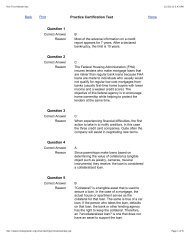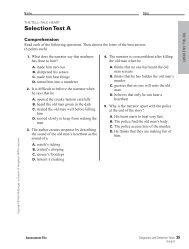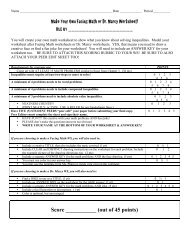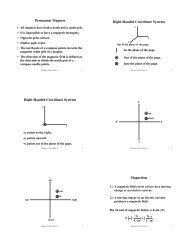WARTIME MIsTAkEs, PEAcETIME ApOLOGIEs by ... - SchoolNotes
WARTIME MIsTAkEs, PEAcETIME ApOLOGIEs by ... - SchoolNotes
WARTIME MIsTAkEs, PEAcETIME ApOLOGIEs by ... - SchoolNotes
You also want an ePaper? Increase the reach of your titles
YUMPU automatically turns print PDFs into web optimized ePapers that Google loves.
Wartime Mistakes,Peacetime Apologies<strong>by</strong> Nancy Day, from Cobblestone MagazineCopyright © <strong>by</strong> Holt, Rinehart and Winston. All rights reserved.On March 13, 1942, Yoshiko Imamoto opened her door to facethree FBI agents. They let her pack a nightgown and a Bible,then took her to jail while they “checked into a few things.”Imamoto had lived in America for twenty-four years. She wasa teacher and had done nothing wrong. But a month earlier,President Franklin D. Roosevelt had issued Executive Order9066, which drastically changed the lives of Imamoto and morethan 120,000 other people of Japanese ancestry living in theUnited States. AAREADING FOCUSTo begin taking notes,underline the main ideaof this paragraph.Dorothea Lange/National Archive10When Japan bombed Pearl Harbor on December 7, 1941,Japanese Americans were caught in the middle. They felt like“Wartime Mistakes, Peacetime Apologies” <strong>by</strong> Nancy Day from Cobblestone: Japanese Americans,April 1996. Copyright © 1996 <strong>by</strong> Cobblestone Publishing, 30 Grove Street, Suite C, Peterborough,NH 03458. All rights reserved. Reproduced <strong>by</strong> permission of Carus Publishing Company.Wartime Mistakes, Peacetime Apologies 13
Americans but looked like the enemy. Neighbors and co-workersALANGUAGE COACHIn the word prisonlike, thesuffix -like is used to turnthe root word prison intoan adjective with a similarmeaning. Other suffixes,like –able and –ful, areused the same way. Write afew words ending in –like,–able, or –ful, and comparetheir meanings to their rootwords. Are the words similarin meaning?20eyed them suspiciously. Then Executive Order 9066, issuedon February 19, 1942, authorized the exclusion of “any or allpersons” from any areas the military chose. The word “Japanese”was never used, but the order was designed to allow the militaryto force Japanese Americans living near the coast to leave theirhomes for the duration of the war. Some were allowed to moveinland, but most, like Yoshiko Imamoto, were herded intoprisonlike camps. AAfter the war, Japanese Americans tried to start over. Theyhad lost their jobs, their property, and their pride. Some usedthe Japanese American Evacuation Claims Act of 1948 to getcompensation for property they had lost. But it was not until thelate 1960s that cries for redress—compensation for all they hadsuffered—began to emerge. BIn 1976, Executive Order 9066 was officially ended <strong>by</strong>BREADING FOCUSPresident Gerald Ford. Four years later, President Jimmy CarterTake notes on this new information<strong>by</strong> underlining themain idea of this paragraph.30signed a bill that created the Commission on Wartime Relocationand Internment of Civilians (CWRIC) to investigate therelocation of Japanese Americans. The CWRIC concluded thatCComprehensionWhat did we learn aboutExecutive Order 9066?DREAD AND DISCUSSVOCABULARYSelection VocabularyYou now know that lob<strong>by</strong>ingrefers to the way people actto influence public officials.Its root word, lob<strong>by</strong>, can alsobe used as a noun when talkingabout politics. What doyou think is the definitionof lob<strong>by</strong>? Use a dictionary tocheck your answer.40Executive Order 9066 was “not justified <strong>by</strong> military necessity”but was the result of “race prejudice, war hysteria, and a failureof political leadership.” In 1983, the commission recommendedto Congress that each surviving Japanese American evacuee begiven a payment of twenty thousand dollars and an apology. CA bill to authorize the payments was introduced in theHouse of Representatives in 1983 but met resistance. Intensivelob<strong>by</strong>ing 1 <strong>by</strong> Japanese Americans was met <strong>by</strong> arguments that thegovernment had acted legally and appropriately at the time. DMeanwhile, three men who had long since served theirjail sentences for refusing to comply with curfew 2 or relocationorders filed suit 3 to challenge the government’s actions. The court1. lob<strong>by</strong>ing (LAHB EE IHNG): activity aimed at influencing public officials.2. curfew (KUR FYOO): Shortly before the relocation began, the head ofthe Western Defense Command, Lt. Gen. John DeWitt, set a curfew.Between 8:00 P.M. and 6:00 A.M. each day, “all persons of Japaneseancestry” had to remain indoors, off the streets.3. filed suit: went to court in an attempt to recover something.Copyright © <strong>by</strong> Holt, Rinehart and Winston. All rights reserved.14 Wartime Mistakes, Peacetime Apologies
EREAD AND DISCUSSFPOComprehensionHow does Yoshiko’s storycome full circle and connectto the beginning of theselection?President Ronald Reagan signs redress bill.© Wally McNamee/CorbisCopyright © <strong>by</strong> Holt, Rinehart and Winston. All rights reserved.50ruled that the government had had no legal basis for detainingJapanese Americans.The rulings increased pressure to provide redress. In 1988,Congress approved the final version of the redress bill, whichbecame known as the Civil Liberties Act. It was signed <strong>by</strong>President Ronald Reagan on August 10, 1988. Two years later,Congress funded the payments.In 1990, at the age of ninety-three, Yoshiko Imamotoopened her door not to FBI agents, but to a small brownenvelope containing a check for twenty thousand dollars andan apology from President George Bush. It had taken almostfifty years and the actions of four presidents, but the governmenthad made redress and apologized for its mistakes. EWartime Mistakes, Peacetime Apologies 15
















